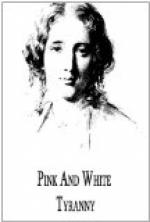Poor Lillie! the world looked dismal and dreary enough to her. She shrunk within herself. Every thing was withered and disenchanted. All her poor little stock of romance seemed to her as disgusting as the withered flowers and crumpled finery and half-melted ice-cream the morning after a ball.
In this state, when she got a warm, true letter from John, who always grew tender and affectionate when she was long away, couched in those terms of admiration and affection that were soothing to her ear, she really longed to go back to him. She shrunk from the dreary plainness of truth, and longed for flattery and petting and caresses once more; and she wrote to John an overflowingly tender letter, full of longings, which brought him at once to her side, the most delighted of men. When Lillie cried in his arms, and told him that she found New York perfectly hateful; when she declaimed on the heartlessness of fashionable life, and longed to go with him to their quiet home,—she was tolerably in earnest; and John was perfectly enchanted.
Poor John! Was he a muff, a spoon? We think not. We understand well that there is not a woman among our readers who has the slightest patience with Lillie, and that the most of them are half out of patience with John for his enduring tenderness towards her.
But men were born and organized by nature to be the protectors of women; and, generally speaking, the stronger and more thoroughly manly a man is, the more he has of what phrenologists call the “pet organ,”—the disposition which makes him the charmed servant of what is weak and dependent. John had a great share of this quality. He was made to be a protector. He loved to protect; he loved every thing that was helpless and weak,—young animals, young children, and delicate women.




